

By
Don and Linda Freedman
Search
TheTravelzine
TheTravelzine Group
Access Your Mail
Don's
Gallery
Packing
Hints
Planning
Tips
Cities
Links
Links
LINKS TO OUR TRAVELOGUES
Argentina, Buenos Aires - Jan-Mar 2010
Argentina, Buenos Aires - Jan-Mar 2009
Argentina, Buenos Aires - Jan-Mar 2008
Austria - Fall 2005
Belgium, Brussels - Fall 2000
Canada - Summer 2002
Canada - Summer 2001
Canada - Summer 2000
Czech Republic - Spring 2000
France - Fall 2002
France, Paris - Fall 2000
France, Paris - Spring 1999
France, Lyon - Spring 1999
Germany, Berlin - Fall 2009
Germany - Fall 2002
Germany - Spring 2000
Germany - Fall 1999
Greece - Fall 2012
Greece - Fall 1999
Greece - Fall 1997
Hungary - Spring 2000
Israel - Fall 1999
Italy - Winter 2007
Italy - Winter 2006
Italy - Winter 2005
Italy - Winter 2004
Italy - Winter 2003
Italy - Winter 2001
Italy - Fall 1998
Italy - Fall 1996
Netherlands - Spring 2000
Portugal, Azores - 2019
Portugal, Azores - 2018
Portugal, Sao Miguel & Lisbon - 2017
Portugal, Azores - 2017
Portugal, Azores - 2016
Portugal, Azores - 2015
Portugal, Azores - 2014
Portugal, Azores - 2013
Portugal, Azores - 2012
Portugal, Azores - 2011
Portugal, Lisbon - 2011
Portugal - Fall 2006
Portugal - Fall 2004
Portugal - Fall 2003
Portugal - Fall 2001
Portugal - Spring 1999
Portugal - Spring 1997
Slovakia - Spring 2000
Slovenia - Spring 1999
Slovenia - Fall 1996
Spain, Barcelona - Winter 2006
Switzerland - Fall 2002
Switzerland - Spring 2000
Switzerland - Spring 1999
Switzerland - Fall 1998
Switzerland - Fall 1997
Switzerland - Spring 1996
U.S. Florida, Key West - Fall 2006
U.S. Florida - Spring 2001
U.S. Maine - Summer 2002
U.S. Massachusetts - Summer 2003
U.S. Massachusetts - Summer 2002
U.S. Massachusetts - Summer 2001
U.S. New York State - Fall 2005
U.S. New York State - Summer 2004
U.S. New York State - Summer 2003
U.S. New York State - Summer 2001
U.S. Washington,DC - Spring 2000
ITALY
WINTER 2006
ROMA 1 | ROMA 2 | ROMA 3 | ROMA 4
FIRENZE | GENOVA |
BOLOGNA | RIMINI
GENOVA
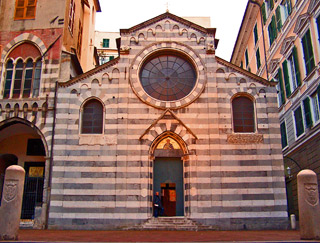 In the fall of 1996 we made our first trip
to Genova (Genoa). We were so impressed we returned in
1998. When planning the initial trip, using the internet,
we met Stefano and Nicoletta who were on hand to greet us
and introduce us to their city. When we arrived in l998
they were awaiting the arrival of their daughter. We have
been fortunate to watch precious Shaila grow up as we
have met over the years in various places.
In the fall of 1996 we made our first trip
to Genova (Genoa). We were so impressed we returned in
1998. When planning the initial trip, using the internet,
we met Stefano and Nicoletta who were on hand to greet us
and introduce us to their city. When we arrived in l998
they were awaiting the arrival of their daughter. We have
been fortunate to watch precious Shaila grow up as we
have met over the years in various places.
It was a one hour ride from Florence to Pisa where we changed trains for Genova, arriving at Stazione Brignole two hours later. Passing the sparkling blue waters of the Ligurian Sea and the gorgeous seaside towns of Lavagna, Chiavari, Rappalo, we knew that Santa Margherita Ligure, Portofino and Camogli were mere minutes away, which evoked wonderful memories of previous visits to this beautiful area.
Genova sits in the middle of all this beauty with her coastline curving 34 kms around her gulf. The city is like an amphitheatre snuggled between the hills around her and the sea. Within this theatre are a multitude of stages for all tastes. There's the beautiful Old Port with the largest aquarium in Europe, trade and exhibition centers, quays and wharves converted into sea walks, open spaces for festivals, concerts and lots of restaurants and cafes.
The old city, the largest historic center in Europe, with its winding streets, labyrinth of caruggi (alleys) and adorable piazzas, is a living treasure chest of the past. Fresh baked bread, mouth watering pastries, jars of preserved foods, farm fresh produce and fish so fresh they blink at you are still sold in the ancient shops that share this tight-knit space with historic Baroque and Romanesque churches and elegant Palazzos.
And then there's the "newer" city with its fine hotels, powerful commercial and public buildings, elegant shopping streets and magnificent squares. This is a prosperous, sophisticated city with a vibrant cultural life that includes theatre, opera, ballet and concerts and arguably some of the best food in Italy.
We are thankful to have discovered this beautiful city that so many other travelers have overlooked and happy to be back to refresh our memories and to see our friends.
The Star Hotel President was a handy choice just across the way from the station, within walking distance of all parts of the city and easily accessible for our friends. It's a chain businessmen's hotel. The staff’s attitude went from cold indifference at check-in, to friendly. The housekeeping was erratic from nice quality towels and bedding etc. to grease on towels and a filthy radiator in the bathroom. The furnishings were chosen for durability rather than beauty. Signs indicated there was a complimentary internet point but it had been removed and the staff was left to explain the logic behind the decision, which clearly was illogical. The buffet breakfast was poorer quality than a businessman would expect. But - the location was right and the view from our upper floor room was terrific.
In front of the Brignole train
station is Piazza G. Verde, a pretty green area which
leads to the enormous Piazza della Vittoria with the
striking "Arch to the Fallen" standing tall at
the center. 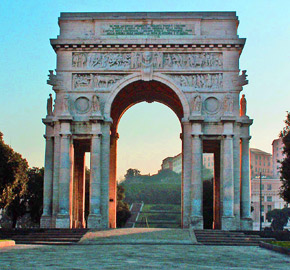 At the other end is a sloping garden with
Columbus's fleet of three ships and their anchors
colorfully etched into the grassy hill. Steps on either
side lead gracefully to the top. The square, surrounded
by office buildings, restaurants, cafes and shops, is a
natural social gathering place for the young.
At the other end is a sloping garden with
Columbus's fleet of three ships and their anchors
colorfully etched into the grassy hill. Steps on either
side lead gracefully to the top. The square, surrounded
by office buildings, restaurants, cafes and shops, is a
natural social gathering place for the young.
The long wide boulevard, Viale
Brigata Bisagno, runs from the station alongside the two
piazzas, all the way to the waterfront. Across from the
squares is a lovely neighborhood of apartment buildings,
food shops, restaurants, cafes, wine bars, etc. It did
not take us long to find several appealing ristoranti.
[Back
to Top]
The first evening we tried La Sagola, Via Della Liberta 104r, Tel. 010 588490. We had not made reservations and when we arrived the two main dining rooms were filled so we were seated in the room with the pizza oven, which was quite comfy, with soft yellow walls adorned with pretty paintings. The other rooms were of typical stucco with high brick arches.
Pizza seemed to be a popular choice but since the thin crust variety is not on our radar, we ordered from the short menu of pastas, grilled fish and meat. I started with taglierini (long spaghetti) ai frutti di mare and filetto di manzo ai ferri was my secondo. Linda’s primo was a caprese salad and she had taglierini with pomodoro and grano as her main. Everything was very good and the prices were reasonable.
The next evening we dined around the corner at Il Pampino, Via Ruspoli 31r, well known for its Argentinean meat, pasta and wine. This local hangout, which attracts a clientele of regulars, is decorated with bottles and cases of wine. Linda had a splendid pasta preparation, pansoti con salsa di noci, hand made pasta pockets filled with cheese and herbs in a heavenly nut cream sauce. My tagliata di angus Argentina con rucola did justice to their reputation, as did the house red wine. With fair prices, good quality and cheerful service and ambiance, Il Pampino is an excellent value and experience.
Via XX Settembre with its eclectic architecture is the central thoroughfare linking the new Genova to the historic center. We detoured into the giant covered market, Mercato Orientale, located in an ancient cloister, where we were assailed by a variety of aromas from fresh baked breads and focaccia to oriental spices. Serious shoppers packed every aisle selecting from the freshest products from the sea and earth. We roamed through and exited at the rear onto the pedestrian way, Via S. Vincenzo, a colorful street filled with young people munching focaccia or enjoying gelato from a shiny, new gelateria. Fashion shops along the way were doing brisk business, with Saldi as popular here as in Rome.
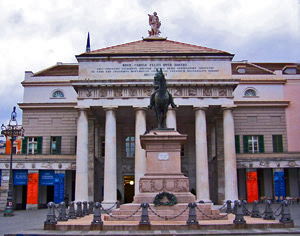 We rejoined Via XX
Settembre at Ponte Monumentale, where it intersects Via S.
Vincenzo and climbed the stairs to the upper level on the
north side of the street to see the Church of S. Stefano,
which was originally built as a fortress. Then back down
to XX Settembre and the covered walkways that lead into
the Piazza de Ferrari, home to the neo-classical beauty,
Palazzo Ducale, for six centuries the headquarters of the
government. Now dedicated to culture, it hosts art
exhibits, conventions, antique shows, etc. The main
staircase and courtyards are very impressive as well as
the frescoed halls and chapels. At the other end of the
Piazza is the Opera House, with a statue of Garibaldi on
horseback guarding its entrance.
We rejoined Via XX
Settembre at Ponte Monumentale, where it intersects Via S.
Vincenzo and climbed the stairs to the upper level on the
north side of the street to see the Church of S. Stefano,
which was originally built as a fortress. Then back down
to XX Settembre and the covered walkways that lead into
the Piazza de Ferrari, home to the neo-classical beauty,
Palazzo Ducale, for six centuries the headquarters of the
government. Now dedicated to culture, it hosts art
exhibits, conventions, antique shows, etc. The main
staircase and courtyards are very impressive as well as
the frescoed halls and chapels. At the other end of the
Piazza is the Opera House, with a statue of Garibaldi on
horseback guarding its entrance.
[Back
to Top]
The chic shopping street, Via Roma, runs north to the beautiful Piazza Corvetto, home to the Museum of Oriental Art, the Jewish Museum and the Doria Spinola, Prefettura di Genova. The walls along the balcony of the Prefettura are covered with fabulous frescoes of great cities of Italy. Continuing north of Via Assarotti we came to Via G. Bertora and tucked into this quiet residential area at #6 is the Comunitß Ebraica di Genova, the only Orthodox Sephardic Synagogue in Liguria. The gorgeous stone building was built in 1935. We were fortunate to find Fernanda who graciously took us on a tour. There is a main sanctuary with attractive menorah-shaped metal railings on the balconies and a smaller chapel with furniture from the end of the 18th century.
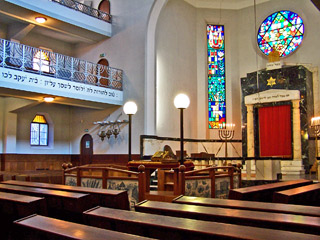 The ancient
Trattoria da Maria is in a narrow alleyway off Via XXV
Aprile at Vico Testadoro #14r. Find a place at a communal
table on one of two levels and for a mere 9 euros you get
to enjoy a surprisingly good meal in an authentic
environment. From the offerings of the day, select a
primo and secondo (with bread and water or wine), relax
and enjoy some genuine Genovese home cooking. The large
bowls of zuppa di cereali e legumi to start were worth
the price of admission but with roast lamb and potatoes
for me and stuffed artichoke with fried zucchini strings
and potatoes for Linda, it was an over-the-top great
value lunch.
The ancient
Trattoria da Maria is in a narrow alleyway off Via XXV
Aprile at Vico Testadoro #14r. Find a place at a communal
table on one of two levels and for a mere 9 euros you get
to enjoy a surprisingly good meal in an authentic
environment. From the offerings of the day, select a
primo and secondo (with bread and water or wine), relax
and enjoy some genuine Genovese home cooking. The large
bowls of zuppa di cereali e legumi to start were worth
the price of admission but with roast lamb and potatoes
for me and stuffed artichoke with fried zucchini strings
and potatoes for Linda, it was an over-the-top great
value lunch.
Via XXV Aprile led into Piazza
Delle Fontane Marose where we admired the lovely restored
frescoed building owned by the Pallavicino family, our
introduction to the stunning streetscape along Via
Garibaldi. It was named Strada Nuova when it was planned
in the mid-1500s as an elite residential way for seven
wealthy families.
[Back
to Top]
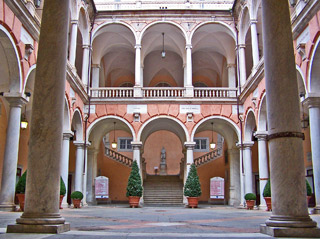 The largest
Palazzo is Grimaldi-Doria Tursi, built for Nicol˛
Grimaldi, known as “the Monarch". Built into
the side of a hill, a marble staircase leads to a gallery
of offices on three levels. Various museums are housed in
these premises as well as the City Hall (seat of the
municipality). Palazzo Gambaro with frescoes by famous
Genovese painters, now the Banco di Chiavari e della
Riviera Ligure, contains a fine art collection. Palazzo
Lerci Parodi was built for Franco Lercari, “The Rich".
The largest
Palazzo is Grimaldi-Doria Tursi, built for Nicol˛
Grimaldi, known as “the Monarch". Built into
the side of a hill, a marble staircase leads to a gallery
of offices on three levels. Various museums are housed in
these premises as well as the City Hall (seat of the
municipality). Palazzo Gambaro with frescoes by famous
Genovese painters, now the Banco di Chiavari e della
Riviera Ligure, contains a fine art collection. Palazzo
Lerci Parodi was built for Franco Lercari, “The Rich".
Palazzo Bianco and Palazzo Rosso across the way, which once belonged to the Brignole family, are home to the Municipal Galleries of Art. The Palazzo Rosso has recently installed an elevator to the top of the building, where there is a platform affording incredible views of the city. This street and this view belong on your list; from here you will grasp the form and shape of Genova.
Back in the Middle Ages in what was
then the Republic of Genova, families used their Palazzi
to show their wealth, vying for superiority. The Doria
family’s domination of the Piazza San Matteo is an
example of this rivalry. The black and white striped
facade of the church overlooks a pleasant square, the
former churchyard, surrounded by the Doria family homes
bearing the same striping as the church.
[Back
to Top]
Via San Lorenzo is a lively pedestrian street that leads down to the port. Today the shoppers were out in droves and groups of street musicians were keeping the beat alive.
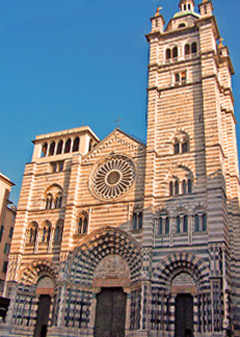 In the middle of the street the monumental
Cathedral of San Lorenzo sits proudly in the Piazza of
the same name that was created to accommodate the
enormous structure. The initial impact of the black and
white striped facade, two bell towers, multi-colored
marble doorways and large rose window is quite imposing.
It is obvious that the lower bell tower never rose to the
height of the other as originally conceived. The interior
is done in many different architectural styles and it can
be seen that the work in various areas was abruptly
stopped and another style started. It is said that the
unfinished work and eclectic architectural mix reflects
the history of the city.
In the middle of the street the monumental
Cathedral of San Lorenzo sits proudly in the Piazza of
the same name that was created to accommodate the
enormous structure. The initial impact of the black and
white striped facade, two bell towers, multi-colored
marble doorways and large rose window is quite imposing.
It is obvious that the lower bell tower never rose to the
height of the other as originally conceived. The interior
is done in many different architectural styles and it can
be seen that the work in various areas was abruptly
stopped and another style started. It is said that the
unfinished work and eclectic architectural mix reflects
the history of the city.
The very pretty Piazza Banchi,
originally the corn market, became the center of trade
for the money changers in the 13th century. The piazza is
graced by two late 16th century beauties, the Loggia dei
Mercanti and the church of D. Pietro in Banchi, with
interesting shops on a ground floor terrace and in the
square.
[Back
to Top]
Nearby Piazza Banchi is the "Carugliu Lungo" (the long alley) which once ran along the seaside linking the port and the city, bordering the network of caruggi. It's still there, albeit a lot further from the sea. Starting at Via delle Grazie, Carugliu Lungo runs into Via Canneto Curto which becomes Via San Luca after Piazza Banchi. The long alley is lined with splendid shops, artists’ studios and ancient churches and buildings.
Just in front of Piazza Banchi is the very ancient street named Sottoripa that indicated its position below the escarpment. (When the sea came too close to this shopping arcade, it was necessary to build an embankment to protect the shops.) It’s a picturesque, lively, bazaar-like shopping experience with products from around the world and local specialties including traditional Genovese wood fired oven-baked goods like farinata, chickpea meal, water and olive oil, and focaccia, flat bread both soft and crisp, dressed with delicious Ligurian olive oil and salt, which must be eaten fresh from the oven.
Moving around the caruggi of the old town can be intimidating so remember that the downward slope leads to the water. The narrow streets and alleyways are packed with wonderful treats, such as ancient buildings, tantalizing food shops, exquisite pastries, cafes, bars, restaurants and bakeries. Some have been around forever, like Genova's first chocolate maker, Viganotti, on Vico Castagna 14r. Chocolates and candied fruits, made on the premises, are sold in the original shop, with its ancient wooden counters and shelves. Barberia Giacalone (barber shop of the family Giacalone) on Vicolo Caprettari was founded in 1882 and renovated in the art deco style in 1922; white tiles, stained glass on the walls and ceiling, lamp shades and oval mirrors offer a reflection of the past.
The Chiesa del Gesu, next to the
Ducal Palace, is rich in frescoes with multi-colored
marble on the floors, pillars and side chapels as well as
two magnificent works by Pietro Paolo Rubens. Behind the
main altar is the "Circoncisione" and "S.
Ignazio Guarisce un'Ossessa" is off to the side.
[Back
to Top]
We left the historic old city through the magnificent Porta Soprana, the old eastern gateway to town, built in 1155-1157 on the vestiges of the 9th century wall. It has been restored many times and of the many houses that had stood nearby, only the so-called Columbus House has survived. It was rebuilt in the 18th century on the ruins of a building owned by the navigator's father. In the garden behind the house are the remains of a 12th century cloister that was part of the destroyed monastery of S. Andrea.
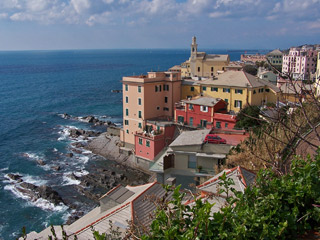 During our visit we had the opportunity to
spend quality time with our friends visiting the nearby
old fishing village of Boccadasse with its precious homes
painted in soft Ligurian pastel hues gently rising around
the tiny harbor. We climbed up and around the narrow
staircases and lanes, admiring the pristine condition of
the houses and grounds, while getting caught up on one
another’s lives.
During our visit we had the opportunity to
spend quality time with our friends visiting the nearby
old fishing village of Boccadasse with its precious homes
painted in soft Ligurian pastel hues gently rising around
the tiny harbor. We climbed up and around the narrow
staircases and lanes, admiring the pristine condition of
the houses and grounds, while getting caught up on one
another’s lives.
We had a wonderful lunch of seafood antipasto, trofile (worm-shaped pasta) with pesto, green beans and potato, and seafood pasta at Giuliano Ristoranti, Via Cavallotti 81r, tel. 010 391 290. Nothing is better than a good meal with dear friends.
Our last dinner before leaving for Bologna was at the Trattoria da Guglie, Via San Vincenzo 64r. Linda finally had farinata that she declared awesome while I had taglierini al sugo di cinghiale that was just okay.
Try to include Genova in your next
Italy itinerary; you’ll be pleasantly surprised.
[Back
to Top]
ROMA 1 | ROMA 2 | ROMA 3 | ROMA 4
FIRENZE | GENOVA |
BOLOGNA | RIMINI
Search TheTravelzine | TheTravelzine Group | Don's Gallery
Packing Hints | Planning
Tips | Cities
Links
All pages on TheTravelzine.comęCopyright 1996-2020 Don & Linda Freedman